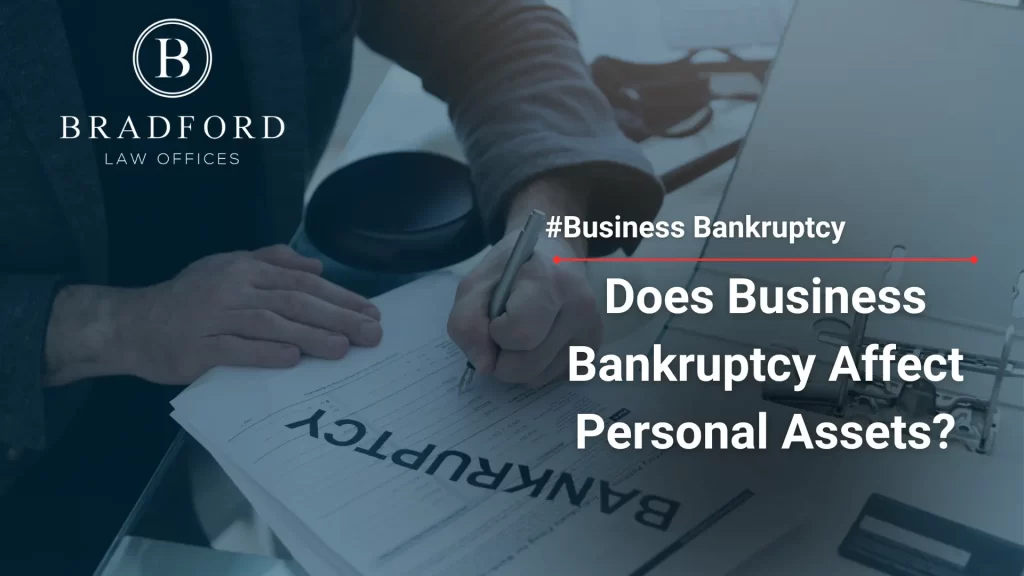Does Business Bankruptcy Affect Personal Assets?
Posted on Monday, July 1st, 2024 at 9:00 am

As a business owner, you’ve devoted your energy and resources to building your company. When financial challenges arise and the prospect of bankruptcy looms, it’s natural to worry about the potential impact on your assets. But does business bankruptcy affect personal assets? This is a common concern for entrepreneurs facing tough decisions.
The answer to this question depends on several factors, including your business structure and the type of bankruptcy you choose to file. Understanding the implications of business bankruptcy on your personal finances will help you make informed decisions and protect your assets.
Business Structure Matters
The first step in determining the potential impact of business bankruptcy on your personal assets is to consider your business structure. The legal entity you’ve chosen for your company determines whether your business and personal finances and assets are treated separately:
- Sole Proprietorship – If you operate as a sole proprietor, there is no legal distinction between your business and personal assets. In this case, filing for business bankruptcy will likely affect your personal assets, as creditors can pursue your personal property to satisfy business debts.
- Partnership – Depending on the type of partnership and the agreement between partners, each partner’s personal assets may be at risk. General partners are typically personally liable for business debts, while limited partners may have some protection.
- Limited Liability Company (LLC) and Corporation – If you structure your business as an LLC or corporation, these entities generally shield your personal assets from business debts. They establish a legal separation between your business and personal finances, offering protection in case of bankruptcy. However, exceptions exist, such as personal guarantees on business loans or instances of fraud.
Types of Business Bankruptcies
The type of bankruptcy you file will also impact how much your personal assets are affected. There are several types of business bankruptcies, each with its own implications:
- Chapter 7 Bankruptcy – In filing for Chapter 7 bankruptcy, the business ceases operations, and a trustee liquidates the business’s assets to repay creditors. Your personal assets may be vulnerable if your business is a sole proprietorship or a partnership. However, if your business is an LLC or corporation, your personal assets are typically protected unless you’ve provided personal guarantees or engaged in fraudulent activities.
- Chapter 11 Bankruptcy – Chapter 11 bankruptcy allows a business to restructure its debts and continue operating. This type of bankruptcy is more complex and expensive than Chapter 7, but it can provide an opportunity to save the business. If your business is an LLC or corporation, your personal assets are generally not at risk. However, you may be liable for those obligations if you’ve guaranteed any business debts.
- Chapter 13 Bankruptcy – Individuals primarily use Chapter 13 bankruptcy, but it can also be an option for sole proprietors. In this type of bankruptcy, you propose a repayment plan to restructure your debts over three to five years. While Chapter 13 can help protect your personal assets, it’s essential to carefully consider the feasibility of the repayment plan and its impact on your business operations.
The Impact on Personal Credit
Another common concern for business owners facing bankruptcy is the potential impact on their personal credit. Does filing for business bankruptcy affect your personal credit? The answer depends on several factors.
If your business is a sole proprietorship or partnership, and you file for bankruptcy, it will likely appear on your personal credit report and impact your credit score. This is because these structures have no legal separation between your business and personal finances.
On the other hand, if your business is an LLC or corporation, filing for bankruptcy may not directly affect your personal credit. However, it’s important to note that any late payments or defaults on business debts leading up to the bankruptcy may still be reported on your credit if you’re liable for those obligations.
Protecting Your Personal Assets

To minimize the impact of business bankruptcy on your personal assets, consider taking the following steps:
- Choose the Proper Business Structure – Forming an LLC or corporation can protect your personal assets.
- Avoid Personal Guarantees – When possible, seek financing options that don’t require personal guarantees or collateral.
- Keep Business and Personal Finances Separate – To avoid commingling funds, maintain separate bank accounts and credit cards for your business and personal expenses.
- Consult with a Bankruptcy Attorney – Work with an experienced Raleigh business bankruptcy attorney to explore your options and develop a strategy that protects your personal assets to the greatest extent possible.
The Importance of Professional Guidance
Facing business bankruptcy and its potential impact on your personal assets can be overwhelming. It’s crucial to seek the guidance of a knowledgeable bankruptcy attorney who can assess your unique situation and provide tailored advice.
If you’re considering business bankruptcy and are concerned about the impact on your assets, don’t hesitate to contact Bradford Law Offices. Contact us today at (919) 758-8879 to schedule a confidential consultation. Our experienced and skilled attorneys will listen to your concerns, answer your questions, and help you move forward.
Related Posts:
What Happens Immediately After You Declare Bankruptcy?